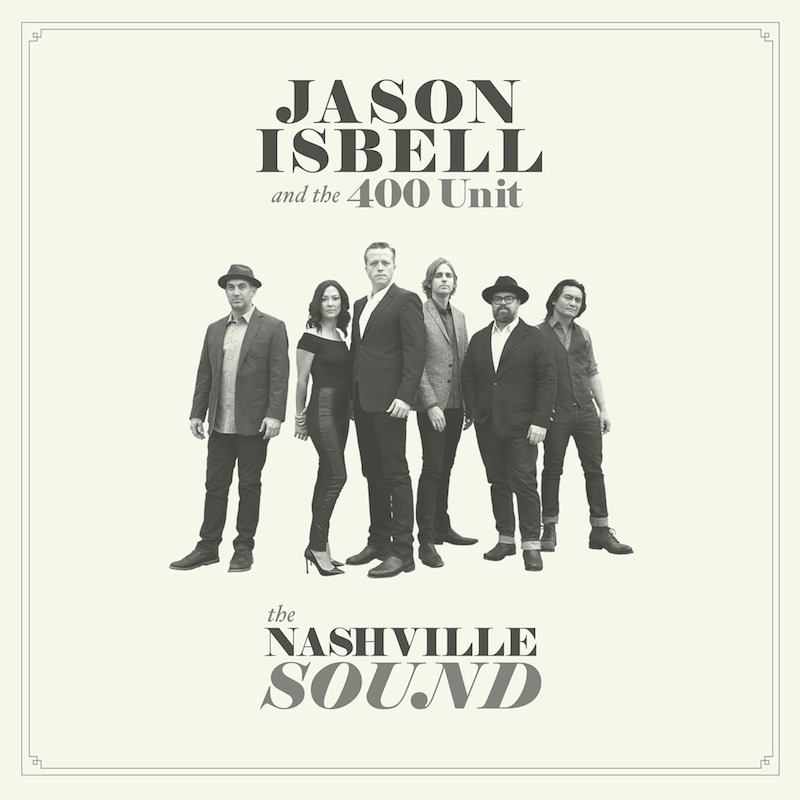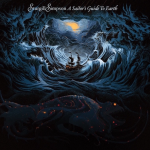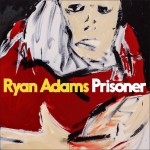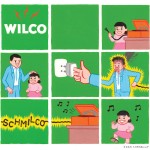Album of the Week: Jason Isbell and The 400 Unit – The Nashville Sound

A brief recap to set the stage: Jason Isbell started his career as a professional musician as the third guitarist in country/southern rock band Drive-By Truckers. That group, even before Isbell, was on the road to a status as future legends, like if Wilco had hewed more closely and unabashedly to the musical (if not the political) lineage of Lynyrd Skynyrd and Gram Parsons and the Byrds. He joined them for the touring of their breakthrough record, Southern Rock Opera, and his time with them saw him pen the song “Goddamn Lonely Love,” one of the most heart-rending and potent songs of the genre.
Seemingly out of nowhere, he was ousted. We learned later the reason was rampant drinking and drug use on his part, relatively uncommon for young musicians on the come-up, especially ones running to escape certain things in their lives. The news was delivered as an amicable split, but the truth was (reasonably) messier; things did become amicable in time, but an amount of hurt and anger is believable. So, in the spirit of the eerily similar story of Dave Mustaine and the founding of Megadeth, Jason Isbell formed a second group, The 400 Unit. It was an easy enough transition, at least for listeners; the Truckers had already gathered a reputation for solo compositions played in band settings, multiple lead vocalists and all, and Isbell even already had one solo album under his belt, recorded just before his departure.
For the most part, the albums satisfied. It was hard then not to compare them to the Truckers, who delivered one nearly-pure country record in Brighter Than Creation’s Dark before settling into a groove that’s seen them comfortably and consistently release some of the most excellent southern rock the genre has seen period. The 400 Unit had songs, granted; Isbell has never faltered as a composer. But the songs sounded a bit uneasy, perhaps taking the wrong shape, crying out for his former bandmates or fewer instruments and voices. And on and on, not just decent but good records teasing something better that hadn’t come together quite yet.
In 2012, after an intervention by the woman who would become his wife, Jason Isbell finally became sober and, shortly thereafter, wrote the greatest album in his career thus far in Southeastern. There was a magic in sobriety that seemed to align all the pieces that prior had not fit quite right, from the rich and literary if restrained storytelling of the lyrics to the plaintive and undoubtedly sincere ache in Isbell’s voice to, at last, just the right instruments in just the right places at just the right times. It was named in year-end lists and then, shortly thereafter, in best-of-the-decade-thus-far lists.
It was also the first record since 2007 delivered not as a 400 Unit record but a solo one, even though they still played on the record and on the tour. The simple cover depicts him in black and white against a featureless background. His follow-up Something More Than Free was much the same, if perhaps to slightly diminishing returns. Footage released of the recording showed Isbell in the studio spitballing ideas with the band, off-the-cuff suggestions for Byrds-style guitars accepted by Isbell on the spot. Which makes the crediting of The Nashville Sound to the 400 Unit again barely a surprise to those following along. Their greater presence is precisely the trick to retune the machine.
One of the greatest unsung features of Isbell’s records from the Truckers to now is the sequencing, the way softer folk-rock or soul-influenced numbers are broken up by louder and more dramatic and cathartic rock tracks. The pacing of this record is no different, starting with the gentle “Last Of My Kind,” a plaintive and meditative country-folk tune hovering around the anxieties of being outmoded by time. Where Southeastern was buffeted by a masterful combination of fictional and searingly autobiographical songs, The Nashville Sound seems to err on the side of singing from experience.
“Cumberland Gap” is an uptempo rock track trapped somewhere between cathartic and whatever the country-rock version of punishing would be. Despite its rage—rage at the state of the American South, in the contradictory beauty and ugliness of small towns, of desire for peace and accomplishment—it’s infectiously catchy, working better as an earworm pop song than damn near any song released this year.
The following track “Tupelo” cools down the mood by shifting to a softer country-folk song about retiring to the famed town of Elvis’ birth, a town which has more legend and emotions and American myth wrapped up in it than could possibly be touched here. And it’s a necessary reprieve; the next track “White Man’s World” is a dour blues about confronting the inheritance of white supremacy as he ponders his newly-born child, and the one after (“If We Were Vampires”) is a meditation on the eventual divorce-by-death even the mightiest marriage must one day undergo. These are adult concerns, things that can be gestured to in youth but whose weight only really begins to settle later in life. Isbell sings these issues compellingly and, in a refreshing turn from what one might expect, rather selflessly; “White Man’s World” focuses on the necessary disgust with the gains of being white in a white world and the battering and brutal hard work of rejecting it, while “If We Were Vampires” is as much a song of sincere adoration for Isbell’s wife as it is one of confronting eventual loss.
This weight is blown out in a track titled, fittingly, “Anxiety,” a seven-minute behemoth of electric guitar and rock sturm-und-drang. It is aimless, perhaps, but only because it tackles an object whose shape is ever-shifting; it makes up for this lack of concision and laser precision, something the other tracks have in spades, by its keen placing in the tracklisting and the way it wisely leans on the excellent drama-building guitar-playing of The 400 Unit. Its instrumental outro, with its near-unison of instruments, prominent bass and absolutely gargantuan anthemic melody, seems designed for U2- or Skynyrd-style megalithic live extensions, moments near the end of setlists designed to tear the roof off and burn the walls to the ground in the ultimate ecstasy of overblown rock and roll catharsis, the greatest thing an electric guitar can ever hope to do.
It is followed by “Molotov”, a deceptively-titled song that skews toward the Byrds-style psychedelic folk and country hybrid. If you pay attention, it’s a gorgeous and simple song about abandoning the “better to burn out than fade away” aspirations of rock ‘n’ roll youth for the greater and subtler joys of love and mercy; after the emotional onslaught of the previous four songs, however, it can sometimes strike the ear more as a gorgeous set of chords and impassioned playing, snatches of lyrics and an impression of peace after the fire. Again, a keen sequencing, with the song serving a greater purpose to the record even if it sacrifices at times the finer details of the piece.
“Chaos and Clothes,” the next in the tracklist, is a grower. The instrumentation is a bit bare, mostly double-tracked acoustic guitar matched with double-tracked vocals with tiny touches lighting up in the background, but the temperature of the song is right for its placement and the lyrics reflect a sense of comfort with maturity that successfully fights off the hackneyed turns of phrase and melodies that sometimes afflict songs like this. There are Radiohead-style swelling electric piano and a lyrics about “a burning ferris wheel, / it’s meaning, anybody’s guess.” The Wilco touchstone comes back to bear here; it is hard to feel a song with touches like these is hackneyed. It is in truth, though, the closest this record has to filler.
“Hope the High Road,” the penultimate track on the record, serves as its thesis. It marries an anthemic country riff with lyrics sputtering out near stream-of-consciousness as Isbell faces the confused and frankly stupid decisions of a young man viewed through a somewhat older man’s eyes. It’s the song that perhaps most succinctly sums up all the rest of the record, that emotionally painful four-song stretch in the middle of the record concisely summed up in the line “Last year was a son of a bitch for nearly everyone we know” while the themes of maturity, comfort in sobriety and commitment to the fulfillments of love and adulthood come through in a flash with the couplet, “I used to want to be a real man / I don’t know what that even means.”
Like “24 Frames” from the previous record, it hews the closest to what one might expect from country while delivering also the greatest highs. Its selection as debut single makes all the sense in the world, being such the focal point of the record as it is. It also offers the closest thing to the endless repeatability of the songs of Southeastern, the ability to lock into one track on loop, belting it over and over alone in your car until your face is red and slick with tears.
This record skews different, feeling more like a novel than Southeastern and Something More Than Free’s collection of related short stories. The final song, “Something To Love,” is a traditionally arranged country song, all acoustic guitars and fiddles and married male and female vocals. It is sweet as sweet can be, a painting of the beauty that sometimes peeks through in life in the American South when it is not obscured by bigotry or violence. It ends the story of The Nashville Sound on a choice to focus on the redemptive moments of love, of devotion, of joy; it is a choice earned by the hardship of the record, both witnessed in others and witnessed in the self. It is a choice with a direction, wanting to expand and multiply loves and devotions and joys out in the world beyond the boundaries of pain. It serves as a fulfillment of the path of Southeastern, offering a fitting moment for the return of credit to his band, and even touches on “Goddamn Lonely Love” in inverse; allowing oneself after a nihilistic youth of rock and addiction and sorrow to feel love and joy and peace. Where so many records this year have felt to be tenuous if promising steps into something new, The Nashville Sound is a rich, full, fitting conclusion, at least for now, to an already run-of-the-decade story.
Similar Albums:
 Sturgill Simpson – A Sailor’s Guide to Earth
Sturgill Simpson – A Sailor’s Guide to Earth
 Ryan Adams – Prisoner
Ryan Adams – Prisoner
 Wilco – Schmilco
Wilco – Schmilco
Langdon Hickman is listening to progressive rock and death metal. He currently resides in Virginia with his partner and their two pets.

